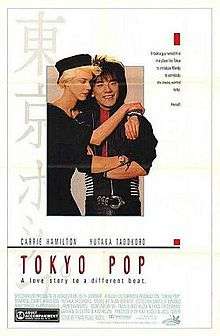Tokyo Pop
| Tokyo Pop | |
|---|---|
 Theatrical release poster | |
| Directed by | Fran Rubel Kuzui |
| Produced by | Kaz Kuzui |
| Written by |
Lynn Grossman Fran Rubel Kuzui |
| Starring |
Carrie Hamilton Diamond Yukai Hiroshi Kobayashi Hiroshi Sugita Satoshi Kanai Rome Kanda |
| Music by | Alan Brewer |
| Cinematography | James Hayman |
| Edited by |
Camilla Toniolo Kristina Boden |
| Distributed by | International Spectrafilm |
Release dates |
|
| Country |
United States Japan |
| Language |
English Japanese |
Tokyo Pop (東京ポップ Tōkyō Poppu) is a music-centric movie from 1988 that tells the story of a girl from the United States, a boy from Japan, and a briefly successful pop band. The movie contrasts American customs with Tokyo lifestyles, as it presents an evolving love story between the two main characters.[1]
The main actors are Carrie Hamilton as Wendy and Diamond Yukai (aka Yutaka Tadokoro) as Hiro Yamaguchi. Other actors included Gina Belafonte and Tetsuro Tamba. The movie was directed by Fran Rubel Kuzui. The members of the legendary metal band X Japan make a brief cameo appearance.
Plot
This is the story of a girl named Wendy Reed, who leaves the USA and her boyfriend, a musician played by Michael Cerveris, and travels to Tokyo, Japan. She plans to visit a girlfriend but cannot find her. Instead she meets a young man named Hiro (pronounced hero), who is the leader of an unsuccessful pop band. As Wendy is blonde and tall by local standards, she attracts attention. She falls in love with Hiro and develops a music career as the movie advances. With some tricks they manage to catch the eye of a record label producer and achieve success for a short time. The song, which is played throughout, is a cover version from John Sebastian's Do you believe in magic? While they top the charts, there is some luxury in their lives, but the blossoming relationship of the main couple starts breaking apart.
In the movie, Tokyo Pop is a one-day business where groups have one hit in the charts and then vanish forever. Since this is the case, Wendy goes back to the US in hopes of finding a more stable career. She had an unforgettable time with Hiro but can leave him behind because he is a marvelous composer, who will find his way through his own power. He no longer needs her to garner the attention of producers.
References
- ↑ Walter Goodman (April 15, 1988). "In 'Tokyo Pop,' Youth Cultures Clash". The New York Times.
External links
- Tokyo Pop at the Internet Movie Database